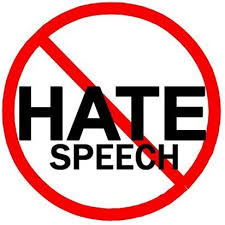NIGERIAN GOVERNMENT AND HATE SPEECH.
 |
| Nigeria government against hate speech. |
Once again, Nigeria’s tyrants are on the rampage. The lions are hunting for innocent lambs to devour. Worldwide, hate speech is seen as a crime and depending on the country and the level of the offence involved, the punishment is very grievous. So no one can blame Nigerian’s government for taking steps to curb hate speech (especially on social media) BUT the government will most likely a difference in opinion to its plans and agenda as hate speech.
According to the Oxford dictionary, hate speech can be defined as an abusive or a threatening speech or a writing that expresses prejudice against a particular group, especially on the basis o race, religion, or sexual orientation.
“Also, hate speech can be defined as a speech that attacks a person or a group on the basis of protected attributes such as race, religion, ethnic origin, national origin, and sex, disability, sexual orientation or gender identity” says Wikipedia.
 |
| Is freedom of speech in Nigeria in danger? |
In March 2018, hate speech prohibition bill was introduced but it did not go beyond third reading before it died. The same bill was reintroduced on Tuesday 13th of November 2019 but since then and it was titled “National Commission For The Prohibition For Hate Speech Bill”, it has been kicked against by different groups and organizations. Foremost among the people kicking against this bill is the presidential candidate for the People’s Democratic Party and the former vice president of Nigeria, Alhaji Atiku Abubakar. Of course, he is not the only one who has been vocal against this bill. Part of the provisions of the bill is to pass a death penalty for anyone who circulates rumour or falsehood that leads to the death of another person.
If passed, this bill would impede on the people’s freedom of speech. Already, Nigeria ranks top among the countries in the world where there is massive violation of fundamental human rights by government agencies and even private individuals. This bill, if passed into law will further exacerbate the situation and to a large extent take away people’s freedom of expression.
At this level, is Nigeria’s government worried about what the people think about it? If yes, why is it so worried? If the government is doing the right thing, why should it be disturbed?
Death penalty is not the only punishment proposed in this bill. There are fines and jail sentences included in the bill according to the category of the hate speech involved. Here is the content of the bill:
 |
| Nigerian Senate moves to pass hate speech to law. |
“According to the bill, any person who commits this offence shall be liable to life imprisonment and where the act causes any loss of life, the person shall be punished with death by hanging.
**Ethnic hatred means hatred against a group of persons from any ethical group indigenous today Nigeria.
– On Ethnic Discrimination, the bill penalizes a person who discriminates against another person if, on ethnic grounds, the person without any lawful justification treats another Nigerian citizen less favourably than he treats or would treat other person from his ethnic or another ethnic group and/or that on grounds of ethnicity.
Harassment on the basis of ethnicity.
– The bill says a person is guilty of ethnic harassment if he justifiably engages in a conduct which has the purpose or effect of violating that other person’s dignity or creating an intimidating, hostile, degrading, humiliating, or offensive environment for the person subjected to the harassment.
– A person who subjects another to harassment on the basis of ethnicity commits an offence and shall be liable on conviction to an imprisonment for a term not less than ten years, or to a fine of not less than N10 million, or to both.
Ethnic or racial contempt.
– The bill stipulates that any person who knowingly utters words to incite feelings of contempt, hatred, hostility, violence or discrimination against any person, group or community on the basis of ethnicity or race, commits an offence.
– The offender shall be liable on conviction be liable to imprisonment for a term not less than five years, or to a tune of not less than N10 million, or to both.
Commission.
According to the bill, a corporate body known as the Independent National Commission for the Prohibition of Hate Speech will be established. The commission will be capable of suing and be sued.
The commission will also be capable of:
– Purchasing or otherwise acquiring, holding, charging or disposing of movable and immovable property,
– Borrowing or lending money; and
– Doing or performing all other things or acts for the furtherance of the provision of the bill.
Functions.
Some functions of the bill include:
– To promote a harmonious peaceful co-existence within the people of all ethnic groups indigenous to Nigeria by ensuring the elimination of all forms of hate speeches in Nigeria, and to advise the Government of the Federal Republic of Nigeria on all aspects thereof.
– Without prejudice, promote the elimination of all forms of hate speeches against any person(s) or ethnic group indigenous to Nigeria.
– Discourage persons, institutions, political parties and associations from advocating or promoting discrimination or discriminatory practices through the use of hate speeches.
– Promote tolerance, understanding and acceptance of diversity in all aspects of national life and encourage full participation by all ethnic communities in social, economic, cultural and political life of other communities;
 |
| Hate crimes in Nigeria. |
– Promote respect for religions, cultural, linguistic and other forms of diversity in a plural society;
– Investigate complaints of ethnic or racial discrimination and make recommendation to the Attorney-General, the Human Rights Commission or any other relevant authority on the remedial measures to be taken where complaints are valid;
– Make recommendations to the Government on any issue relating to ethnic affairs including whether ethnic relations are improving;
Power to summon witnesses.
The bill recommends that the commission shall have power to summon witnesses and call for the production of books, plans and other documents and to examine witnesses and parties on oath.
It also states that every person summoned to attend and give evidence or produce books, plans or other documents at any sitting of the commission shall be bound to obey the summons served upon him as if such summons were issued by the High Court, and shall be entitled to like expenses as a summoned to attend the High Court on a criminal trial.
Complaints.
The bill allows for aggrieved persons to complain to the commission by lodging a written complaint to it by hand, facsimile or other electronic transmission or post, setting out the alleged contravention.
The bill however, allows the commission to decline to entertain some complaints where:
– The commission considers that a complaint(s) is ferrous, vexatious, misconceived or lacking in substance;
– The complaint involves subject matter that would be more appropriately dealt with by a court;
– It involves subject matter that has been adequately dealt with by a court; or
– it relates to an alleged contravention of the Act that took place more than 12 months before the complaint was lodged, the Commission may decline to entertain the complaint by notifying the complainant and the respondent in writing within forty five (45) days after the day the complaint was lodged.
Investigations.
The bill further states that if the commission becomes aware of circumstance(s) where a contravention of the provision(s) of the Act may have occurred (other than an alleged contravention that is the subject of proceedings before the Commission), the commission may initiate investigation.
The commission is also allowed to extend its investigation on a matter when necessary.
If the commission, after investigation, is satisfied that a person has contravened a provision of the Act, the commission shall make all reasonable endeavor to conciliate that matter, it says.
*The Federal High Court shall have and exercise exclusive jurisdiction to try all offences under the Act….”
My Personal Opinions about the Bill.
To me, I believe that this bill is another devise by the political class to exert their power and influence over the people. The only weapon the people have in Nigeria today is the freedom to freely express their opinion about government and its policies. Imagine what would happen when this power is taken from them on the basis of being prosecuted.
Though the content of the bill expertly doesn’t say anything about attacking the government but for anyone who can read between the lines, it is obvious that the government will not tolerate any form of verbal or written opposition to its actions and policies and the only way to ensure this, is to pass this bill into law. Who doesn’t know that this government is desperate to shut the people up from expressing their views on where the government is wrong? Aren’t we all aware that the government is looking for means to suppress opposition? This bill is against freedom of expression, thus, it should be passed into law. We must all stand against this bill.



This hate speech drama shows how jobless our lawmakers are. Instead of them to work on more important issues, they are wasting tax payer's money on useless matters.
ReplyDeleteI share your opinion about this hate speech bill. For lack of something concrete and tangible to do, our political elite are on rampage to pounce on anyone who speaks against them. Even if they commit this crime, they will go scot free with it but a poor man would be hanged for it.
ReplyDeleteThanks for your comments, we are happy to know that you are here.
ReplyDelete